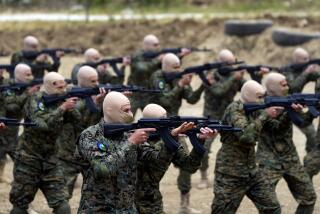Anti-Israel Feelings Limit Arabs’ Support
- Share via
CAIRO — Many Arab countries are reluctant to give unconditional support to a U.S. strike against suspected terrorists because of hard feelings and anti-Western sentiment resulting from the conflict between Palestinians and Israelis.
Support of the Arab community is essential if Washington is to avoid having its campaign against terrorism defined by enemies as a religious struggle by Christians and Jews against the Islamic world.
It also is a key element in the Bush administration’s efforts to isolate extremist groups, cut off their funding and eliminate their havens.
U.S. officials have said that Afghanistan-based Osama bin Laden is a prime suspect in Tuesday’s attacks and have issued a “with us or against us” ultimatum to other countries.
The United States is likely to win at least the rhetorical support of most of the key players in the Arab world. The enormity of the tragedy has made it virtually impossible for all but the region’s most isolated leader, Iraq’s Saddam Hussein, to do anything less than condemn the attacks. Even Libya’s Moammar Kadafi has offered condolences.
But the issue for Arab leaders is more nuanced.
While it appears that most Arab leaders are speaking the same anti-terrorism language as the Americans, in many cases they do not agree on what constitutes terrorism. Officials here say, for example, that talk of terrorism must also address Israeli occupation of the West Bank and Gaza Strip. Perhaps recognizing their depth of feeling, President Bush has pressured Israel to resume talks with the Palestinians, so far to no avail.
“You go in any salon in the country and everybody is saying terrorism must be stopped,” Lebanese Prime Minister Rafik Hariri said in a telephone interview Saturday. “But they consider occupation also as an act of terrorism.”
Syrian President Bashar Assad has written to the White House condemning Tuesday’s attacks and committing his country to help fight terrorism. But Syria also supports the Lebanese group Hezbollah, saying it is a liberation force. The United States considers Hezbollah a terrorist militia.
“Arabs have always been fiercely opposed to terrorism in all its forms,” the Syrian official daily newspaper Al Baath said in a recent editorial. However, it said they also support “legitimate resistance against occupation.”
Saudi Arabia, America’s most important Persian Gulf ally, has so far provided the strongest support in the region. It has said it will help find the culprits and will cut financial aid to the Taliban, which controls most of Afghanistan and offers sanctuary to Bin Laden.
Key American allies Egypt and Jordan have been more cautious.
Jordan, with a population that is more than half Palestinian, has been very critical of America’s role in supporting Israel during the current intifada, or uprising. For almost a year, Israeli forces have battled Palestinians in a conflict that has left more than 740 people dead, about 80% of them Palestinian.
“Officially, we told them that Jordan is beside the United States to confront this monster and we have to finish off terrorists everywhere,” Minister of Information Saleh Qallab said in an interview Saturday. “We told the United States that we are with them. In practical terms, we have to negotiate what they need, what they want.”
Egyptian President Hosni Mubarak explicitly condemned the attack but has also noted that he has been warning for years about the globalization of terrorism.
Nabil Osman, director of the state information service, said Egypt has urged a U.N.-sponsored effort to fight terrorism.
“We are not talking about military coalitions, we are talking about a system,” he said. “No country should give terrorists asylum, for example.”
Foreign Minister Ahmed Maher told reporters Saturday that Egypt is committed to supporting America’s search for the terrorists, but he cautioned against hasty action.
In Lebanon, where officials try to straddle the divide between Syria, which has de facto control of Lebanon’s political process, and their country’s need for Western investment, officials talk of an unconditional commitment to help America--but not without mentioning the need to address the Palestinian question.
“We have 100% sympathy with the Americans,” Hariri said. “We understand that terrorism is against humanity and against our religion and principles and against everything we stand for. On the other hand, we want to see all the problems in the region resolved.”
In deciding their stance, Arab leaders are keeping an eye on their own streets, where citizens are increasingly suspicious of what is viewed as the United States’ rush to blame Arabs. Their concern is compounded by worries that America will use its war on terrorism as a pretext to settle old scores.
More to Read
Sign up for Essential California
The most important California stories and recommendations in your inbox every morning.
You may occasionally receive promotional content from the Los Angeles Times.













